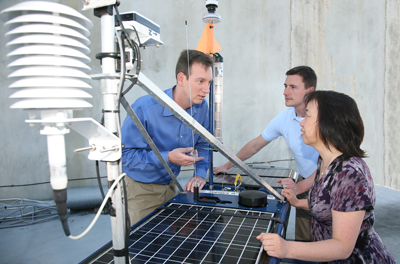Curriculum - Meteorology
Master of Science in Meteorology
Entrance to a program leading to a Master of Science in Meteorology degree requires a baccalaureate degree with completion of mathematics through differential and integral calculus and a minimum of one year of college physics.
The Master of Science in Meteorology degree requires completion of:
- Necessary prerequisite courses in mathematics (through partial differential equations) and meteorology
- The sequence of core courses in the fields of dynamical, numerical, physical and synoptic meteorology
- An approved selection of graduate elective courses
- An acceptable thesis
The total number of quarter-hours in (2) and (3) above must be at least 36. These 36 hours must include 18 quarter-hours at the 4000 level in courses other than directed study.
Requirements for Entry
The master's program is open to International Officers, officers from other services, and DoD civilians. It is open to Information Dominance Corp (18xx) and Unrestricted Line officers of the U.S. Navy and officers from other services. Students in the USAF Basic Meteorology Program (BMP) are also listed in this curriculum. The remainder of this section applies to the MS degree program.
For the master's program, a baccalaureate degree with completion of mathematics through differential and integral calculus and a minimum of one year of college physics is required. An APC of 233 is required for direct entry. A refresher quarter is available for candidates who do not meet all admission requirements for direct entry and is normally offered in the Summer quarter prior to 372 enrollment.
Entry Date
Meteorology is a six-quarter course of study with a normal entry date in the Fall quarter. For further information contact the Program Officer. Academic questions may be referred directly to the Academic Associate.
Master of Science in Meteorology and Physical Oceanography
Direct entrance to a program leading to the Master of Science in Meteorology and Physical Oceanography degree requires a baccalaureate degree in one of the physical sciences, mathematics or engineering. This normally permits the validation of a number of required undergraduate courses such as physics, differential equations, linear algebra, vector analysis, and various courses in meteorology and/or oceanography which are prerequisites to the graduate program. These prerequisites may be taken at the Naval Postgraduate School; however, in that event, the program may be lengthened by one or more quarters.
The Master of Science in Meteorology and Physical Oceanography degree requires completion of:
- Necessary prerequisite courses in mathematics (through partial differential equations), meteorology, and physical oceanography
- The sequence of core courses in the fields of dynamical, numerical, physical and synoptic meteorology and oceanography
- An approved selection of graduate elective courses in meteorology and oceanography
- A significant educational experience in the field using instruments
- An acceptable thesis on a topic approved by the department
The total number of quarter-hours in (2) and (3) above must be at least 48. These 48 hours must include 20 hours at the 4000 level in courses other than directed study, and they should show an approximate balance between the disciplines of meteorology and oceanography.
Dual Degree in Meteorology and Physical Oceanography
The Meteorology and Oceanography Departments have adopted a policy to not recommend the award of dual master's degrees in Meteorology and Physical Oceanography.
Doctor of Philosophy of Meteorology
The requirements for the degree are grouped into three categories: course work, research in conjunction with an approved dissertation and examination in both the major and, if elected, a minor field. The minor field is usually in physical oceanography, mathematics or physics.
The Department of Meteorology also may require a preliminary examination to show evidence of acceptability as a doctoral student.
Prospective students should consult with the Chairman of the Department of Meteorology for further guidance regarding doctoral programs.

Doctoral students Lt. Cmdr. Corey Cherrett, left, and Lt. Travis Wendt, center, and NPS Department of Meteorology Professor Qing Wang discuss plans to integrate NPS’ wave-glider autonomous surface vehicles into various data collection phases of the CASPER research program. The Office of Naval Research sponsored multidisciplinary research initiative looks to effectively model environmental effects on the electromagnetic spectrum.

